Recognition of same-sex unions in Japan
Same-sex marriage is not recognized in Japan. As of 17 May 2020, 49 municipalities and two prefectures issue same-sex partnership certificates which provide some benefits but do not offer any legal recognition.[1][2] Most polls conducted since 2013 have found that a slight majority of Japanese people support the legalization of same-sex marriage or partnerships,[3] and a 2018 poll found it supported by an overwhelming majority of those under age 60.[4]
|
Civil unions and registered partnerships
|
||
|
See also
|
||
|
Notes
* Not yet in effect or automatic deadline set by judicial body for same-sex marriage to become legal |
||
|
LGBT portal | ||
Japan is the only country in the G7 group that does not provide any kind of legal recognition for same-sex couples.[5]
Partnership certificates
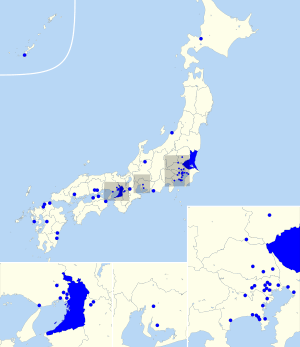
On April 1, 2015, Shibuya in central Tokyo announced that it would offer same-sex couples special "partnership certificates" (Japanese: パートナーシップ宣誓制度, pātonāshippu sensei seido) which are stated to be equivalent to marriage. While these licenses are not legally recognized as marriage certificates, they are still a useful tool in civil matters such as hospital visitation rights and housing.[6][7] The Shibuya city office began accepting applications on 28 October 2015.[8]
In response to this action by the Shibuya city office, the "Special Committee to Protect Family Ties" (家族の絆を守る特命委員会, kazoku no kizuna wo mamoru tokumei iinkai) of the federal ruling Liberal Democratic Party was formed in March 2015 to discuss the matter. An officer from the Ministry of Justice who was invited to comment stated that the action by Shibuya is legal because the certificate issued is not a marriage certificate and the current Japanese legal code does not prohibit the "partnership" of same-sex couples.[9]
In July 2015, Tokyo's Setagaya Ward announced that it would be joining Shibuya in recognizing same-sex partnerships from 5 November of the same year.[1][10][11] On 30 November 2015, the special city of Takarazuka, located in Hyōgo Prefecture, announced it would issue partnership certificates to same-sex couples beginning on 1 June 2016.[12][13] In December 2015, the city of Iga in Mie Prefecture made a similar announcement with certificates starting on 1 April 2016.[2][14][15] On 22 February 2016, Naha, the capital of Okinawa Prefecture, announced it would begin issuing partnership certificates to same-sex couples on 8 July 2016, making it the first core city in Japan to recognize same-sex couples.[16][17][18][19]
In April 2016, an LGBT rights group began a campaign for the official recognition of same-sex couples in Sapporo, the capital of Hokkaido Prefecture. The group took its petition to the Sapporo City Government in June 2016.[20] In December 2016, officials announced that Sapporo planned to draw up guidelines by March 2017.[21] In March, the City Government announced that partnership certificates would be issued to couples beginning on 1 June 2017. While the certificates hold no legal meaning, some insurance companies use them to allow same-sex partners to be added as beneficiaries. According to the city, about 1,500 people expressed opinions welcoming the program, while some opposed it.[22][23] Sapporo became the first designated city in Japan to recognize same-sex couples.[24]
On 14 February 2018, the Fukuoka City Government announced plans to start issuing partnership certificates to same-sex and different-sex couples from 2 April 2018.[25][26] Osaka followed suit on 9 July 2018,[27] and Chiba on 29 January 2019.[28][29][30]
Tokyo's Nakano Ward began offering partnership certificates in August 2018. Couples can receive notarized documentation recognizing a delegation agreement for medical treatment and nursing care, property management and other areas in which married couples share responsibility.[31] The town of Ōizumi, in Gunma Prefecture, began issuing partnership certificates on 1 January 2019.[32]
On 1 April 2019, the municipalities of Edogawa,[33] Fuchū, Hirakata,[34] Kumamoto, Odawara,[35][36] Sakai,[37][38][39] Sōja, Toshima and Yokosuka all started recognizing same-sex couples.[40][41][42][43][44][45][46][47] The city of Hida also planned to start issuing such certificates that same day, however, this was postponed to an unspecificed date.[48]
Kanuma,[49] and Miyazaki began issuing partnership certificates on 3 June and 10 June 2019, respectively,[50][51] while Kitakyushu began doing so on 1 July,[52] Nishio on 1 September,[53] Nagasaki on 2 September,[54][55] Sanda on 11 October,[56] Katano on 22 November,[57] Yokohama on 2 December,[58][59] and Daitō and Kamakura on 4 December.[60][61]
On 1 January 2020, Mitoyo began issuing partnership certificates,[62] followed by Amagasaki on 6 January.[63] On 1 April 2020, a total of 13 municipalities throughout Japan began issuing partnership certificates to same-sex couples. These include the designated cities of Hamamatsu,[64][65] Niigata,[66] Sagamihara,[67] and Saitama,[68] as well as the cities of Koga,[69][70] Nara,[71] Takamatsu,[72] Tokushima,[73] Yamatokōriyama,[74][75] and Zushi,[76] and the town of Kijō.[77] Two special wards of Tokyo, namely Minato and Bunkyō, also started issuing certificates.[78][79] Kawagoe and Toyoake followed suit on 1 May 2020.[80][81]
In mid-May 2020, two cities in Hyōgo Prefecture began issuing partnership certificates, namely Itami on 15 May and Ashiya on 17 May.[82][83]
Measures to allow partnership certificates have been proposed in numerous areas, including several administrative wards in Tokyo, such as Arakawa, Chiyoda, Chūō, Katsushika, Kita, Kōtō, Nerima, Sumida, and Taitō, and the cities of Abashiri, Hachiōji, Hannō, Iruma, Kōchi,[84] Kazo, Moroyama and Sakado.[85]
Prefectural partnership systems
In January 2019, the Government of Ibaraki Prefecture announced it was considering introducing partnership certificates for same-sex couples in April 2019.[86][87][88] In March 2019, Governor Kazuhiko Ōigawa expressed his personal support for the introduction of such a scheme, while the Ibaraki Prefectural Assembly was still considering legislation to this effect.[89] The Assembly began examing such a partnership measure in June 2019, with reportedly positive reviews.[90] The prefecture has offered partnership certificates since July 1, 2019, which made it the first prefecture to do so.[91][92] Eight days later, Mito, the capital of Ibaraki Prefecture, announced it would let couples who are in the possession of the prefecture's partnership certificates move into the municipality's public housing facilities, starting in August 2019.[93]
On 15 January 2020, Osaka Prefecture announced it would start a partnership system on January 22.[94] Governor Hirofumi Yoshimura said in a statement that "we should aim for a society where one can live as themselves". The first couple to receive a certificate were Shuji Yamada and Shigeo Hiruda on 31 January. The certificate allows couples to apply to move into prefectural housing and consent to surgery, among other limited benefits. 5 cities in the prefecture had already established such a system before its extension to the entire prefecture.[95]
Mutual recognition
On October 30, 2019, the cities of Fukuoka and Kumamoto announced that they would share and recognize each other's partnership certificates effectively immediately. This marked the first time that two or more jurisdictions in Japan had recognized each other's partnership certificates, easing recognition for same-sex couples.[96] On 6 November, Kitakyushu Mayor Kenji Kitahashi stated that he wants his city to join the other two cities in their cooperation.[97]
On December 2, 2019, Yokosuka Mayor Katsuaki Kamiji announced his intention to establish a similar joint recognition with the cities of Zushi and Kamakura, taking effect on 1 April 2020 when Zushi's certificates became available.[98]
In June 2020, Okayama and Sōja agreed to mutually recognize their certificates and eliminate the need for new procedures when couples move between the two cities. Okayama has reached a similar agreement with Hiroshima, and is considering one with Takamatsu, Kagawa.[99]
List
The following 49 municipalities and two prefectures offer "partnership certificates", comprising about 27% of the Japanese population. In 12 further jurisdictions, such policies have yet to take effect.
Municipalities







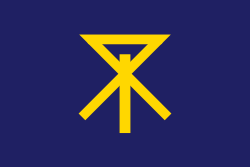









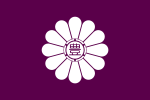
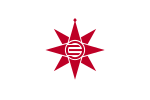














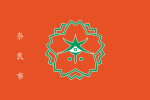







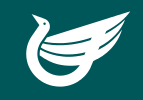

Jurisdictions with policies yet to take effect


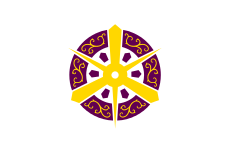







Statistics
The first couple to receive a partnership certificate were Koyuki Higashi and Hiroko Masuhara in Shibuya on 5 November 2015. They were personally congratulated by Mayor Ken Hasebe.[8] On that same day, Setagaya Ward also began recognising same-sex partnerships, and distributed partnership certificates to 7 couples.[8] By April 2017, 17 same-sex couples had been issued partnership certificates in Shibuya.[111]
Nijiiro Diversity maintains statistics on the number of registered couples.[112] It has found a large increase in partnerships: 319 in late November 2018,[113] 426 in April 2019,[114] 617 in October 2019,[115] 759 in January 2020,[116] and 945 in April 2020.[117]
| Prefecture | Total |
|---|---|
| Tokyo | 257 |
| Osaka | 240 |
| Kanagawa | 104 |
| Hokkaido | 92 |
| Fukuoka | 72 |
| Chiba | 63 |
| Okinawa | 30 |
| Ibaraki | 28 |
| Hyōgo | 18 |
| Miyazaki | 10 |
| Shizuoka | 6 |
| Mie | 5 |
| Niigata | 4 |
| Nagasaki | 3 |
| Saitama | 3 |
| Tokushima | 3 |
| Kumamoto | 2 |
| Nara | 2 |
| Gunma | 1 |
| Kagawa | 1 |
| Okayama | 1 |
| Aichi | 0 |
| Tochigi | 0 |
Marriage
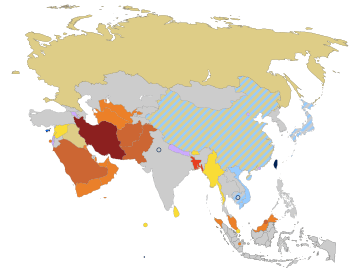
Same-sex sexual activity legal
(stripes: nonbinding certificates)
Same-sex marriage (同性結婚, dōsei kekkon)[lower-alpha 1] is not recognized in Japan. However, debate surrounding the issue has emerged in recent years, with several political parties expressing support or openness to discuss the matter. Several lawsuits contesting the same-sex marriage ban were filed in court in February 2019. In addition, numerous opinion surveys have shown high levels of support for same-sex marriage among the Japanese public, notably among women and the younger generation.
Background
On March 27, 2009, it was reported that Japan allows its nationals to marry same-sex foreign partners in countries where same-sex marriage is legal. Japan does not allow same-sex marriage domestically and had so far also refused to issue a document, which states a person is single and of legal age and is required for citizens to wed overseas, if the applicant's intended spouse is of the same legal sex. Under the change, the Ministry of Justice instructed local authorities to issue the key certificate for those who want to have same-sex marriages.[118]
In June 2011, the deputy head abbot of Kyoto's Shunkō-in Zen temple announced that the temple would perform same-sex marriage ceremonies as part of Gay and Lesbian Pride Month.[119]
Since 15 May 2012, Tokyo Disney Resort has allowed symbolic (not legally recognized) same-sex marriage ceremonies in its Cinderella's Castle hotel;[120] On March 3, 2013, its first same-sex marriage was held.[121] Koyuki Higashi married her partner Hiroko Masuhara.[122]
In March 2019, the Justice Ministry revoked a deportation order for a gay Taiwanese man who remained in Japan illegally after overstaying his visa, giving consideration to his longtime same-sex relationship with a Japanese national. The ministry issued a special residency permit to the man, who had lived in Japan for about 25 years. The ministry's Immigration Bureau granted him a one-year resident visa after the Tokyo District Court suggested that it review the order.[123][124]
Constitution
Article 24 of the Japanese Constitution states:[125] "Marriage shall be based only on the mutual consent of both sexes and it shall be maintained through mutual cooperation with the equal rights of husband and wife as a basis." Previously, a couple in Japan could marry only if their respective head of household (the father, or in the absence of a father, the eldest son) consented to the union. As a result, arranged marriage was the dominant form of marriage. Those couples who could not obtain permission had to elope and stay in common-law marriage.
The purpose of Article 24 of the new Constitution was to assert freedom of consenting adults to marry, and to explicitly establish the equality of both sexes in marriage. The wording defines marriage as a union of husband and wife. Some legal scholars argue that because the intent behind the article was not in reference to same-sex marriage, it need not apply in legalising same-sex marriage. However, conservative lawmakers as well as legal scholars who take a literal approach to constitutional interpretation argue that such an argument is a stretch.[126]
In February 2015, the National Diet debated whether same-sex marriage should be recognized under Japan's Constitution.[127] Kota Matsuda, a member of the House of Councillors, said:
We need to eliminate lifestyle difficulties for same-sex couples. A prerequisite to achieving this goal is dealing with Article 24 of the Constitution.
Japanese Prime Minister Shinzō Abe expressed his opinion on the issue:[127]
Extending the institution of marriage to same-sex couples was not anticipated under the current Constitution. It is an issue that concerns the very core of family values and, I believe, one that requires extremely careful consideration.
In July 2019, the Japan Federation of Bar Associations submitted a paper in support of same-sex marriage to the Minister of Justice, the Prime Minister, the Speaker of the House of Representatives and the President of the House of Councillors. The paper states that Article 24 does not ban such marriages, as "the notion of same-sex marriage was beyond the scope of assumption at the time of [its] enactment", and that prohibiting it constitutes a major breach of human rights, urging the National Diet to revise the laws in order to legalize same-sex marriage.[128][129][130][131]
Political support and legislation
The Constitutional Democratic Party of Japan (CDP) supports same-sex marriage.[132] In December 2018, the party announced it would introduce a bill to amend the Civil Code so as to allow same-sex marriage sometime in 2019.[133] On 3 June 2019, the bill was submitted by the CDP, the Japanese Communist Party and other parties. It seeks to adopt neutral language with the terms "party of marriage" being used instead of "husband" and "wife", while "father and mother" would be replaced by "parents".[134][135][136] In June 2019, the CDP added the legalisation of same-sex marriage and ending discrimination against the LGBT community to their party platform ahead of the 2019 Japanese House of Councillors election.[137]
Legal challenges
In November 2018, several same-sex couples throughout the country announced their intention to file suit against state authorities, arguing that the refusal to recognise same-sex marriage is unconstitutional.[138] In January 2019, about a dozen same-sex couples applied for marriage certificates at different city offices in Japan.[139] Lawsuits contesting the same-sex marriage ban were filed on 14 February in district courts in Tokyo, Osaka, Nagoya and Sapporo.[140]
Koseki
In Japan, each citizen is registered through the koseki system whereby an individual is registered as a part of household (while in the West, a birth certificate can act as a proof of identity). Koseki registration performs a somewhat similar role to marriage in the West as it endows a member of the same koseki legal power (as next of kin) in dealing with civil matters such as inheritance, hospital visits or the right to organise a funeral. Therefore, registering each other as a part of the koseki works as a substitute for Western-style marriage. As a consequence, Japanese gay couples, in the absence of same-sex marriage or civil partnership laws, often use adoption procedures to register themselves as belonging to the same household (where the older partner legally adopts the younger partner, which in absence of a spouse makes the only adopted child the sole executor of that household).
Public opinion
A May 2013 Ipsos poll found that out of over a thousand Japanese adult interviewees, 24% of respondents were in favor of same-sex marriage and another 27% supported other forms of recognition for same-sex couples.[141] An April 2014 Ipsos poll found that 26% of respondents were in favor of same-sex marriage and that 24% were in favor of some other form of recognition for couples.[142] A May 2015 Ipsos poll found 30% of respondents in favour of same-sex marriage and a further 28% in favour of some other form of recognition (meaning that 58% supported recognising same-sex couples in some form).[143]
According to a survey by Nihon Yoron Chōsa-ka, conducted on 1 and 2 March 2014, 42.3% of Japanese supported same-sex marriage, while 52.4% opposed it.[144] Another poll conducted by FNN in April 2015 showed that 59% supported the same-sex partnership certificate law proposed in Shibuya and 53% supported same-sex marriage. This was the first time a poll had found majority support for same-sex marriage.[145][146] An additional poll conducted in November 2015 showed a 51% majority as supporting same-sex marriage, unions or partnerships.[3] 41% were opposed. People under the age of 20 were overwhelmingly in favor of same-sex marriage (72% support), whereas people aged 70 and over overwhelmingly opposed same-sex marriage (24% support).[147]
A 2017 opinion poll released by the NHK showed that 51% of Japanese supported same-sex marriage.[148]
According to an opinion poll carried out by Dentsu in October 2018, 78.4% of Japanese in their 20s to 50s were in favour of same-sex marriage.[149] Support was higher among women (87.9%) than men (69.2%), and was higher among younger respondents: 87.3% for people in their 20s, 81.2% for people in their 30s, 77.5% for people in their 40s, and 72.5% for people in their 50s.[150]
The National Survey of Household Trends, a government survey that was carried out in 2018 and commissioned by the National Institute of Population and Social Security Research, asked Japanese married women about their views on legalizing same-sex marriage. 71.9% of respondents chose one of the two answers in favour of it. Levels of support were clearly different between the different age groups: 92.1% for married women under the age of 30, 89.5% for those between the ages of 30 and 39, 83.2% for those between the ages of 40 and 49, 73.5% for those between 50 and 59, 59.3% for those between 60 and 69, and 42.2% for those aged 70 and higher.[151][152][153]
See also
Notes
- Japanese pronunciation: [do̞ːse̞ː ke̞k̚kõ̞ɴ]; Okinawan: どーしーぬにーびち, dooshii nu niibichi, Ryukyuan pronunciation: [doːɕiːnuniːbit͡ɕi]
References
- "Tokyo's Setagaya Ward to begin legally recognizing same-sex partnerships". Rocket News 24. 31 July 2015.
- Williams, Joe (December 26, 2015). "Another Japanese city to recognise same-sex relationships". Pink News. Retrieved December 26, 2015.
- Watanabe, Chisaki (2015-11-29). "Majority of Japanese Support Same-Sex Marriage, Poll Shows - Bloomberg Business". Bloomberg.com. Retrieved 2015-12-27.
- Dooley, Ben (2019-11-27). "Japan's Support for Gay Marriage Is Soaring. But Can It Become Law?". The New York Times. ISSN 0362-4331. Retrieved 2019-11-28.
- Knight, Kyle (14 June 2019). "Global Call to Reform Japan's Law on Transgender People". Human Rights Watch.
- Master Blaster. "Japan government hard at work trying to prevent Shibuya Ward approving same-sex marriages". Rocket News 24.
- "The First Place In East Asia To Welcome Same-Sex Marriage". NPR.org. 11 May 2015. Retrieved 30 June 2015.
- Tokyo’s Shibuya and Setagaya wards issue first same-sex partnership papers
- 二階堂, 友紀 (26 March 2015). "渋谷区の「同性婚」条例案、自民内から異論相次ぐ". 朝日新聞社. Retrieved 26 March 2015.
- "Tokyo's Setagaya Ward to begin legally recognizing same-sex partnerships". Japan Today. 31 July 2015. Retrieved 30 September 2015.
- Tokyo’s Shibuya and Setagaya wards issue first same-sex partnership papers
- Wee, Darren (December 1, 2015). "Takarazuka first city in Japan's Kansai region to certify gay couples". Gay Star News.
- "Takarazuka becomes fourth Japanese municipality to recognize same-sex partnerships". RocketNews24. 1 June 2016.
- Masanori, Hiuchi (1 March 2016). "City in Mie Prefecture to recognize same-sex partnerships in April". Asahi Shimbun. Archived from the original on 2016-03-02. Retrieved 2016-03-12.
- "3rd municipality in Japan starts issuing same-sex partnership papers". Japan Today. 3 April 2016.
- 酷新聞:好消息!日本沖繩那霸市 承認同性伴侶 (in Chinese). Age of Queer. 27 February 2016.
- "那覇市、同性パートナーシップ制度を開始へ【LGBT】" (in Japanese). The Huffington Post. 23 February 2016.
- "Naha starts system to certify same-sex marriages". The Japan Times. 8 July 2016.
- Wilson, Scott (7 July 2016). "Okinawa's capital city Naha officially recognizes same-sex partnerships". RocketNews24.
- Sekine, Kazuhiro (8 April 2016). "Sapporo LGBT activists to take fight for equality to city officials". Asahi Shimbun.
- Sapporo to join other cities in recognizing same-sex partnerships as marriages
- Sapporo to become first major city to recognize LGBT couples in June
- Sapporo will be Japan’s first major city to recognise same-sex relationships
- Sapporo first major city in Japan to issue certificates recognizing same-sex couples
- "Fukuoka city to become Japan's seventh municipality to recognize LGBT couples". The Japan Times. 14 February 2018.
- "Fukuoka begins official recognition of LGBT partnerships". The Japan Times. April 2, 2018.
- "Osaka to start recognizing LGBT couples from July". Kyodo News. 28 June 2018.
- "Chiba to issue nonbinding certificates recognizing same-sex and common-law couples". The Japan Times. 25 August 2018.
- "Chiba 1st Japan city to certify both common-law marriage and LGBT couples". Kyodo News. 29 January 2019.
- 「世間の価値観変えたい」 千葉市パートナーシップ宣誓制度施行 市民や事業者にも理解を (in Japanese). Yahoo! Japan. 30 January 2019.
- "Tokyo's Nakano Ward to offer partnership certificates to same-sex couples this summer". The Mainichi. 10 May 2018.
- (in Japanese) LGBTパートナー認定、群馬・大泉町が来月導入
- 同性パートナーシップ制度 江戸川区も導入. 日テレNEWS24 (in Japanese). 15 March 2019.
- 定例記者会見(平成31年2月). Hirakata-shi homepage (in Japanese). 1 March 2019.
- パートナーシップ制度、小田原市が4月導入 県内2例目. カナロコ (Kanaloco) (in Japanese). 22 February 2019.
- 性的少数者カップル公認 横須賀市、小田原市が制度導入へ. カナロコ (Kanaloco) (in Japanese). 31 March 2019.
- 堺市パートナーシップ宣誓制度. Sakai-shi homepage (in Japanese). 12 March 2019.
- "LGBT「パートナー宣誓制度」創設へ 大阪府堺市で4月から". HuffPost Japan (in Japanese). 2 February 2019.
- 堺市も同性パートナー 4月導入、事実婚は含めず /大阪. Mainichi Shimbun (in Japanese). 31 January 2019.
- (in Japanese) 府中市、LGBTパートナー認定 来年4月に
- 飛騨市がパートナーシップ証明制度 LGBTや事実婚対象. 岐阜新聞Web (in Japanese). 16 February 2019.
- (in Japanese) 熊本市がパートナー公認へ LGBT、来年4月導入
- (in Japanese) 横須賀市がLGBTパートナーシップ制度を導入へ
- 性的少数者や事実婚、横須賀市も4月からパートナー制度. Asahi Shimbun (in Japanese). 14 February 2019.
- 同性カップル認定へ パートナーシップ制度、26日に条例案 /岡山. Mainichi Shimbun (in Japanese). 20 February 2019.
- (in Japanese) LGBTなど 豊島区も「パートナーシップ制度」導入へ
- 東京・豊島区がパートナー制度 条例制定、渋谷に続き全国2例目 (in Japanese). The Sankei News. 22 March 2019. Retrieved 25 March 2019.
- パートナーシップ制度を延期 飛だ市、議会から「拙速」. Asahi Shimbun (in Japanese). 20 March 2019.
- 同性カップル、夫婦同等に 鹿沼市、県内初の宣誓制度 6月導入. Sankei Shimbun (in Japanese). 23 April 2019.
- "宮崎市6月にも導入 LGBTパートナーシップ". Miyanichi Press. 24 February 2019.
- "Kitakyushu City starts partnership system from July 1st. "I would like to change from the administration first"". HuffPost. 11 June 2019.
- 7月からパートナーシップ制度導入. Mainichi Shimbun (in Japanese). 21 February 2019.
- 西尾市パートナーシップの宣誓の取扱いに関する要綱. city.nishio.aichi,jp
- "ートナーシップ宣誓制度」9月2日開始 長崎市、県内初の導入". Nagasaki Shimbun (in Japanese). 20 August 2019.
- "同姓カップル認定 都市部から 長崎市「パートナーシップ制度」導入". Nishinippon Shinbun (in Japanese). 2 September 2019.
- "三田市が同性カップル認定 制度導入は県内2例目". 神戸新聞NEXT (in Japanese). 13 October 2019.
- "交野市パートナーシップ宣誓制度を実施". city.katano.osaka.jp. 22 November 2019.
- "パートナーシップ制度 市が年内導入へ". townnews.co.jp (in Japanese). 2 October 2019.
- "横浜市、パートナーシップ制度導入 LGBTや事実婚で". Nihon Keizai Shinbun (in Japanese). 13 November 2019.
- "【11月19日発表】「大東市パートナーシップ宣誓制度」スタート!". city.daito.lg.jp (in Japanese). 19 November 2019.
- "神奈川・鎌倉市、パートナーシップ制度を導入". 日本経済新聞 電子版 (in Japanese). Retrieved 2019-12-04.
- "三豊市パートナーシップ宣誓制度を導入します!". www.city.mitoyo.lg.jp (in Japanese). 2 December 2019.
- "神戸新聞NEXT|阪神|性的少数者のパートナー制度 尼崎市、1組目の受領証交付". www.kobe-np.co.jp (in Japanese). Retrieved 2020-01-13.
- "LGBTカップル公認制度 浜松市、4月施行". Shizuoka Shimbun (in Japanese). 6 February 2020.
- "LGBTカップル公認へ 浜松市、要綱制定を検討". Shizuoka Shimbun (in Japanese). 6 June 2019.
- "新潟市で4月1日から同性パートナーシップ宣誓制度導入、北信越で初". OutJapan (in Japanese). 12 March 2020.
- "「パートナー制度」4月導入". TownNews.com (in Japanese). 18 March 2020.
- "LGBT「パートナーシップ制度」 さいたま市、4月1日開始". tokyo-np-co-jp (in Japanese). 20 December 2019.
- "パートナーシップ宣誓制度、古賀市が来月導入 性的少数者カップル支援 /福岡". Mainichi Shimbun (in Japanese). 3 March 2020.
- "パートナーシップ宣誓制度、古賀市が来月導入 性的少数者カップル支援 /福岡". Mainichi Shimbun (in Japanese). 3 March 2020.
- "奈良市で「パートナーシップ宣誓制度」を導入". PR Times (in Japanese). 14 February 2020.
- "高松市が同性パートナーシップ証明制度導入を決定、三豊市でも年明けから". www.outjapan.co.jp (in Japanese). 4 December 2019.
- "徳島市が4月から同性パートナーシップ証明制度を導入". OutJapan (in Japanese). 1 March 2020.
- "性的少数者カップル認証 県内初、大和郡山市が制度導入 /奈良". mainichi.jp (in Japanese). 29 November 2019.
- "性的少数者カップル公認へ 制度の概要など解説/大和郡山市が「市パートナーシップ宣誓制度」". 47NEWS (in Japanese). 23 March 2020.
- "逗子市 「パートナー制度」導入 来月から 鎌倉、横須賀市と連携も". Tokyo Shimbun (in Japanese). 24 March 2020.
- "LGBTパートナーシップ宣誓制度 木城町導入へMiyanichi" (in Japanese). 23 March 2020.
- "みなとマリアージュ制度をスタートします(制度の概要)". city.minato.tokyo.jp (in Japanese).
- "文京区パートナーシップ宣誓の取扱いについて" (PDF). city.bunkyo.lg.jp (in Japanese).
- "川越市パートナーシップ宣誓制度". city.kawagoe.saitama.jp (in Japanese).
- "パートナーシップ宣誓制度について". city.toyoake.lg.jp (in Japanese).
- "同性カップルに証明書 「婚姻に準ずる」と認定へ". Kobe Shimbun (in Japanese). 13 May 2020.
- "芦屋市パートナーシップ宣誓制度". city.ashiya.lg.jp (in Japanese).
- "高知市に同性パートナー制導入を 県内NPOが署名提出". Kochi Shimbun (in Japanese). 14 February 2020.
- "Sexual minorities seek recognition of same-sex partnerships from 23 municipal assemblies". The Mainichi. 5 June 2018.
- "茨城県がパートナーシップ制度導入を検討 LGBTなど対象 都道府県初" (in Japanese). Mainichi Shimbun. 30 January 2019.
- 茨城県が「パートナーシップ制度」導入めざす 都道府県で初めて、同性カップルの権利後押し (in Japanese). HuffPost Japan. 30 January 2019.
- "Ibaraki to consider LGBT rights bill". The Japan News. 31 January 2019.
- パートナーシップ導入へ条例改正案可決 茨城県議会. The Sankei News (in Japanese). 25 March 2019.
- "LGBTパートナー制度など報告書案 茨城県の勉強会". Nikkei Asian Review (in Japanese). 6 June 2019.
- Glauert, Rik (24 June 2019). "In a first, entire prefecture in Japan will register same-sex partnerships". Gay Star News.
- "茨城県が「パートナーシップ宣誓」受け付け開始 都道府県で初". Mainichi Shimbun (in Japanese). 1 July 2019.
- "同性カップル市営住宅OK 水戸市が方針 県の宣誓制度で : 地域". Yomiuri Shimbun (in Japanese). 9 July 2019. Retrieved 2019-07-10.
- "「大阪府パートナーシップ宣誓証明制度」を開始します". 大阪府 (in Japanese). Retrieved 2020-01-16.
- "大阪府で同性パートナーシップ証明制度がスタート、第1号のゲイカップル「いつか法的権利を」". OutJapan (in Japanese). 1 February 2020.
- "LGBTカップルを相互承認 ("LGBT couples mutually approved"". NHK.or.jp (in Japanese). 30 October 2019.
- "北九州市、LGBT制度で連携へ パートナーシップ宣誓 先に導入の福岡・熊本両市と /福岡". 毎日新聞 (in Japanese). Retrieved 2019-11-13.
- "2019年12月議会・一般質問". hide-fujino.com (in Japanese). 2 December 2019.
- "Okayama to join other Japan cities issuing certificates for same-sex partnetships". Japan News. Okayama. 1 June 2020.
- "いなべ市がパートナーシップ宣誓制度 条例案提出へ". Chunichi Shimbun (in Japanese). 27 May 2020.
- "パートナーシップ制度 川崎市も20年度導入へ". Yahoo! (in Japanese). 18 February 2020.
- "市民・企業から意見募集パートナーシップ宣誓制度案発表". TownNews.com (in Japanese). 17 April 2020.
- "パートナーシップ宣誓制度導入へ 岡山市長「性的少数者を応援」". Sanyo Shinbun (in Japanese). 7 February 2020.
- "性的少数者カップルを認証 パートナーシップ宣誓制度、京都市も導入へ". Yahoo! Japan (in Japanese). 26 May 2020.
- "明石市も「パートナー制」 性的少数者対象 来年度にも導入 /兵庫". Mainichi Shimbun (in Japanese). 19 September 2019.
- "パートナーシップ制度 葉山町も20年度導入目指す". kanaloco.jp (in Japanese). 14 November 2019.
- "東京都小金井市も同性パートナーシップ証明制度を導入へ ". OutJapan.co (in Japanese). 18 February 2020.
- "「パートナー制度」を相互利用 岡山市と広島市、20年度". Tokyo Shimbun (in Japanese). 7 February 2020.
- 習志野市、指針 パートナー宣誓制度、20年度導入へ /千葉. Mainichi Shimbun (in Japanese). 15 February 2019.
- "藤沢市が導入検討へ". TownNews.com (in Japanese). 13 March 2020.
- Tokyo Rainbow Pride participants march for ‘change’ in LGBT recognition
- 自治体のパートナーシップ制度 (in Japanese).
- 319 Couples Using Partnership Systems Across Japan
- 自治体のパートナーシップ (in Japanese). 17 April 2019.
- 自治体のパートナーシップ制度 (in Japanese). 8 October 2019.
- 地方自治体の同性パートナー認知件数 (2020年1月20日時点) (in Japanese). 1 January 2020.
- "地方自治体の同性パートナー認知件数 (2020年4月20日時点)". Nijiiro Diversity (in Japanese). 22 April 2020.
- "Japan allows its citizens same-sex marriage abroad". Google. Agence France-Presse. 27 March 2009. Retrieved 10 March 2013.
- Rev. Taka (May 11, 2011). "Promoting the Same-Sex Marriage and LGBT Rights in Japan". Shunkoin Today.
- 同性結婚、ミッキーマウスも支持 東京ディズニーリゾート - AFP(2012年9月8日閲覧)
- 元タカラジェンヌと女性のカップルが、東京ディズニーリゾートで初の同性挙式 - インターナショナルビジネスタイムズ(2013年3月3日閲覧)
- "Japan's first 'official' same-sex couple announce separation". JapanTimes. Retrieved 26 July 2018.
- "Japan cancels deportation of Taiwanese man in same-sex relationship". South China Morning Post. 24 March 2019.
- "Justice Ministry overturns deportation order for gay Taiwanese man without visa". The Japan Times. 22 March 2019.
- "THE CONSTITUTION OF JAPAN", Japan.Kantei.Go.Jp, accessed 17 May 2018.
- "Abe: Gay marriage not an option under the Constitution". AJW by The Asahi Shimbun. Archived from the original on 19 February 2015. Retrieved 30 June 2015.
- "Amending the Constitution / Unanticipated situation: same-sex marriage". The Japan News. 30 May 2016.
- "Japan's top bar association urges Diet to legalize same-sex marriage". The Japan Times. 25 July 2019.
- "Japan's top bar association urges authorization of same-sex marriage". Kyodo News. 25 July 2019.
- Glauert, Rik (25 July 2019). "Equal marriage in Japan just got a major legal boost". Gay Star News.
- "Japanese lawyers demand same-sex marriage". NHK. 25 July 2019.
- "LDP 'instructs' Sugita to educate herself after anti-gay article". The Asahi Shimbun. 3 August 2018.
- CDP to seek Civil Code revisions to recognize same-sex marriage, The Mainichi, 31 December 2018
- Nobuhiro, Emi (3 June 2019). "Japan Opposition Parties Submit Same-Sex Marriage Bill". Bloomberg.
- Milton, Josh (3 June 2019). "Japan opposition parties rally in bid to pass marriage equality". Gay Star News.
- "Japan opposition parties submit same-sex marriage Bill". The Straits Times. 3 June 2019.
- "Constitutional Democrats unveil campaign promises". NHK. 24 June 2019.
- Same sex couples to sue state seeking marriage recognition on constitutional grounds, The Mainichi, 14 November 2018
- Satomi Sugihara (17 January 2019). "Gay couple file for marriage in Yokohama, challenges law". The Asahi Shimbun.
- "Same-sex marriage lawsuits to be filed on Valentine's Day by 13 couples nationwide". The Mainichi. 4 February 2019.
- "Same-Sex Marriage". Ipsos. 7–21 May 2013. Archived from the original on 14 March 2016.
- "Same-Sex Marriage: Respondents in 15 Countries Assess Their Views on Same-Sex Marriage". Ipsos. June 2014. Archived from the original on 2015-01-06.
- "This Is How Many People Support Same-Sex Marriage In 23 Countries Around The World - BuzzFeed News". Buzzfeed.com. Retrieved 2015-11-10.
- "52.4% of Japanese say they oppose same-sex marriage". The Japan Times. Retrieved 30 June 2015.
- "あなたは同性婚についてどう思う?〜世論調査の結果から日本の未来を考える〜 | ミライロ". Mirairo.co.jp. Archived from the original on 2015-12-08. Retrieved 2015-11-10.
- "【産経・FNN合同世論調査】少年法の対象年齢引き下げに賛成82%、内閣支持率は53・6%で4カ月連続上昇(2/2ページ) - 産経ニュース". Sankei.com. 2015-03-30. Retrieved 2015-11-10.
- "日逾五成民眾 贊成同性婚姻合法化". 中廣新聞網. 2015-11-29. Archived from the original on 2015-12-08.
- "NHK民調:日本逾5成民眾挺同婚". 中央社. 2017-05-04.
- "Dentsu Diversity Lab Conducts "LGBT Survey 2018"". Dentsu. 10 January 2019. Retrieved 2019-11-28.
- "Survey: 78% of Japanese in 20s to 50s favor legal gay marriages". The Asahi Shimbun. 28 January 2019.
- "70% of married women in Japan support same-sex marriage". The Japan Times. 13 September 2019.
- "日本の約7割の既婚女性は同性婚を合法化すべきだと考えている。金曜日に政府調査の結果が明らかになった。ジャパンタイムズが伝えた。". Sputnik News (in Japanese). 17 September 2019.
- "National Survey of Household Trends". 政府統計の総合窓口 (in Japanese). September 13, 2019. pp. 59-60. Retrieved 2020-01-21.